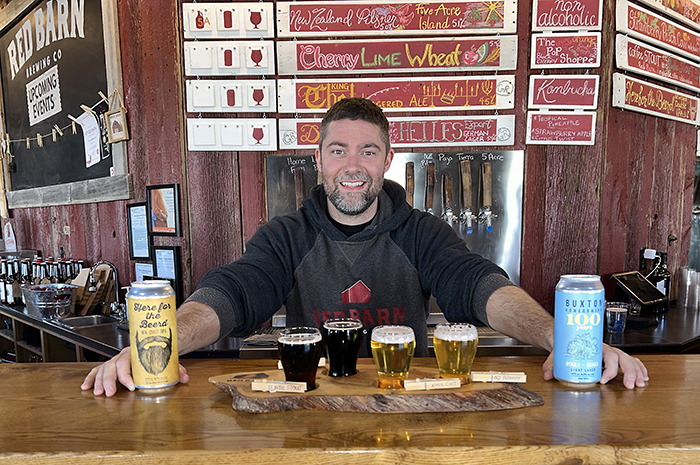
Denny Vervaet hopes high Ontario taxes don’t ultimately lead to the canning of many a craft brewery in this province.
The co-owner of Red Barn Brewing Co. north of Blenheim said taxes for breweries in Ontario are the highest in the country.
“There are a lot of breweries going under right now. They just can’t catch up from Covid and they face these taxes,” he said. “In Ontario, our taxes are eight times higher than Alberta.”
There is a shift in the works, as the Ford government announced late last year that it intends on reviewing the taxation system on beer in the province. However, the speed at which government operates could leave some craft breweries circling the drain.
The government did recently opt to freeze beer taxes in the province for at least two years.
It’s a move applauded by the lobby group Beer Canada, but Vervaet is waiting for a shift in the pressures put upon smaller breweries.
A potential game changer for the industry is the announcement that beer, wine and ready-to-drink cocktails will be sold in convenience stores in two year’s time. The question is when will the province alter its taxation structure on beer.
“Profit margins are tight,” Vervaet said, adding there is less pressure on the big suppliers. “Someone like me, we employ 17 people. We’re taxed at the same rate for anyone who brews up to 49,000 hectolitres (4.9 million litres). It’s tough.”
One hectolitre equals 100 litres.
Vervaet estimated that in 2022, Red Barn produced 700 hectolitres of beer, yet it is taxed at the same rate as a brewery producing 70 times more.
He said the margins are even tighter for canning one’s brew and selling it in that manner.
“There’s a lot of expense in packaging and there are a lot of government fees,” Vervaet said. “Having a pint in the tap room helps us stay alive.”
Provincial figures indicate taxes on breweries add up quickly. There’s a basic beer tax of 39.5 cents a litre and a beer volume tax in Ontario of 17.6 cents a litre. So, on every six-pack of traditional sized bottles of beer (341 ml), that adds a tax of $1.14 onto making the product.
For craft breweries that usually sell larger 473 ml cans, tax on a six pack of those adds up to about $1.62.
Furthermore, an environmental tax of 8.93 cents must be paid on each can used to package beer.
Scott Simmons, president of Ontario Craft Brewers, has said in previous publications that if changes aren’t made soon, some of Ontario’s craft brewers will shut down.
Along with the ability to sell ready-to-drink beverages in convenience stores, the government is altering how The Beer Store handles craft beer as well.
In the past, the government-controlled distributors dictated everything, from who gets to sell beer in their stores to what flavours and brands are to be sold there.
Finance Minister Peter Bethlenfalvy, who issued a flowery joint statement with Simmons last year, said The Beer Store will be required to distribute any brewer’s beer and cannot impose minimum order quantities.
Vervaet said such restrictions in the past steered Red Barn clear of The Beer Store and LCBO.
“The LCBO model has turned into a marketing game. It has trapped a number of brewers,” he said. “Once they’re in, they can’t go back. They have to have extra capacity and extra tanks. There are not a lot of options.”
Breweries that work with the LCBO also have to sell at prices determined by the provincial body. And if your beer isn’t a hit, you take the financial hit.
“The LCBO, if they drop your line or our brand, then you’re in big trouble,” Vervaet said. “If it’s not selling, they’re not going to put it on the shelf.”
Red Barn, which has been around since 2020, instead is on the shelves at agency outlets in Erieau and outside Rondeau Provincial Park.
“It’s a model where we can sell directly to the store manager. For us, it’s a great marketing tool,” Vervaet said. “We’re supporting that local store owner and hopefully they’re going to come and visit us at the Barn.”






